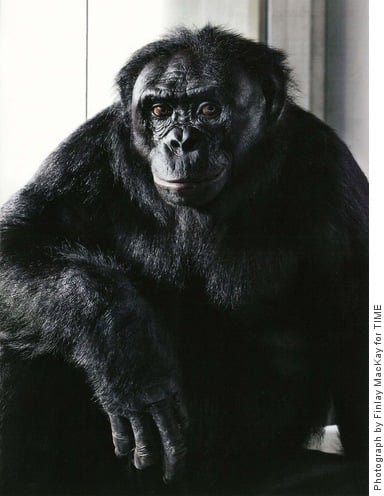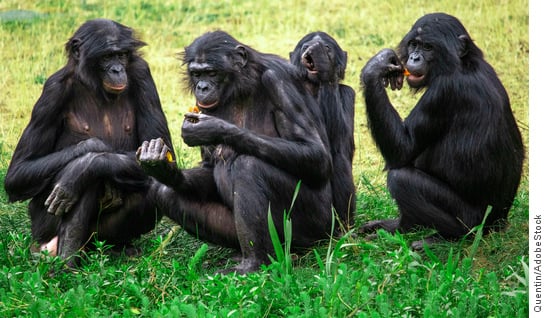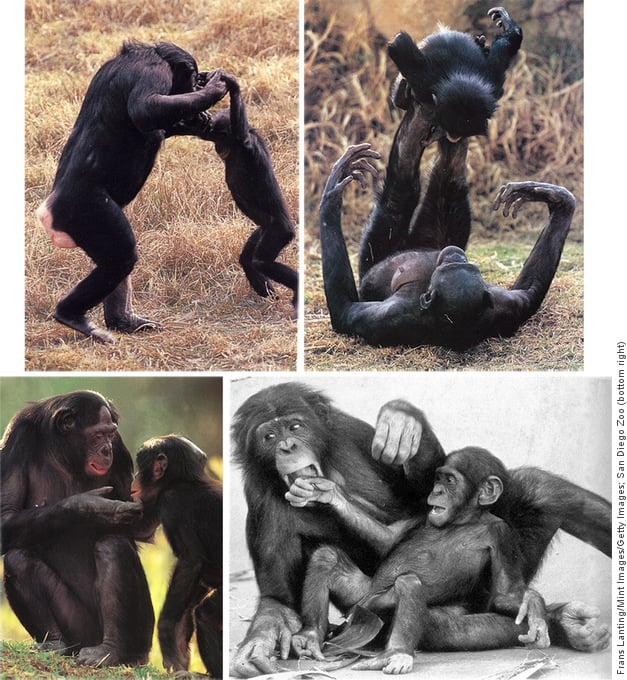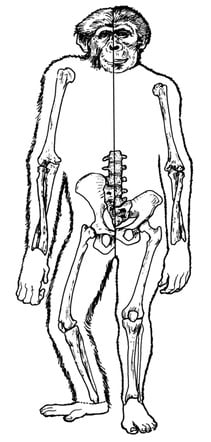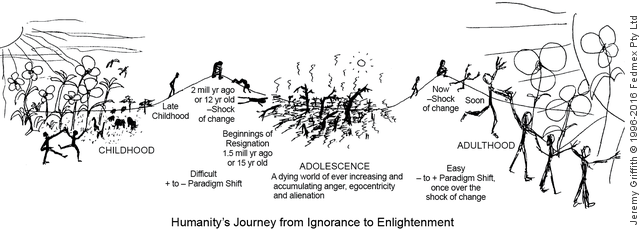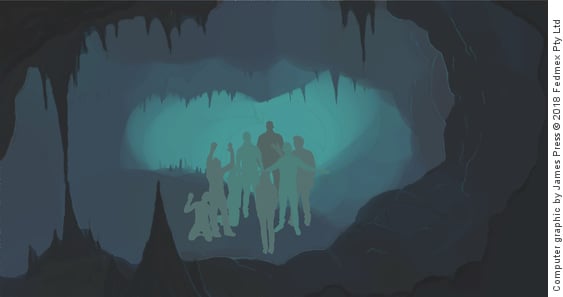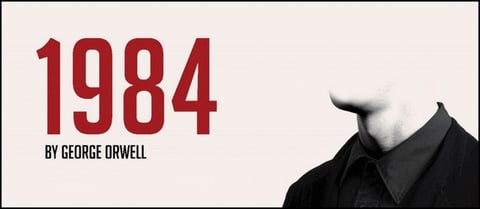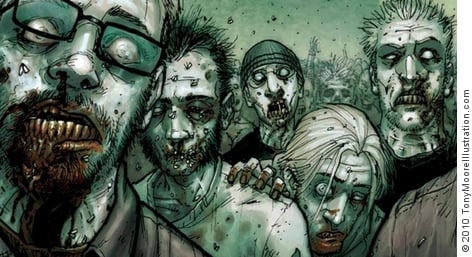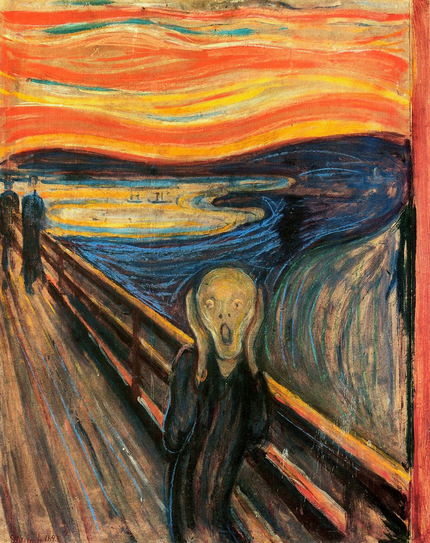Part 1
The Dishonest Biology
Note: Parts 1 & 2 are expanded transcripts of Jeremy Griffith’s
speech at the 2016 launch of FREEDOM at the RGS in London.
Thank you Tim, my wonderful, wonderful friend on this long and very difficult journey to this day, for your kind introduction.
Most especially I want to thank Sir Bob Geldof for your inspiring and encouraging address. My gratitude to you for agreeing to help with the launch of FREEDOM is completely bottomless, because in my view, Sir Bob, your concern for humanity is second to none, and your preparedness to relentlessly point out the horror of our species’ predicament makes you the conscience of the world. I love your prophetic honesty so much that to me it’s like the coming of the summer rains that water the parched Earth! Thank you.
______________________
I would like to begin by referring to some of the amazingly honest statements Sir Bob has made about the extremely serious plight of the human race.
You have just stated that you’ve ‘never felt the world more threatening, more fractious, more fissiparous, more febrile, more fucked up than it is now.’
And in your 1986 album with the appropriate title Deep in the Heart of Nowhere, you sang, ‘What are we going to do because it can’t go on…This is the world calling. God help us’, and ‘Searching through their sacred books for the holy grail of “why”, but the total sum of knowledge knows no more than you or I.’ Yes, ‘why’ are we humans the way we are, competitive, aggressive and selfish when the ideals of life are so obviously to be cooperative, loving and selfless—how are we to explain the HUMAN CONDITION?
At a recent conference in Montreal, you asked, ‘Where is the public good in the vast inequality wrought by modern capitalism…which is just a euphemism for greed?’, and you said, ‘I’ve never felt greater fear and greater anger than I do today.’ (I should say at this point that the ‘good’ reason for ‘capitalism’ and ‘greed’ will be explained in Part 2 of this booklet.)
In 2002 you pleaded, ‘Can the void, the nothingness, that we appear to inhabit ever be filled?’
In your 2006 book Geldof in Africa, you wrote about ‘attempting to make sense of…the scale of the horror, the utter devastation’—and referred to ‘world leaders’ pathetic plans’ to help. And asked, ‘What will ever stop the madness?’
In your brilliant W.B. Yeats documentary last month, you pleaded for Yeats’s ‘revolution of the mind’ where ‘peace, pluralism and respect’ will replace hate and aggression, and you referred to ‘the ludicrous notion of death or glory’ practised in Ireland during the 1916 Easter Uprising.
And, finally, at the very end of Geldof In Africa you wrote, ‘I’m sick of standing in squares and linking arms…of tear gas and pop concerts…Feed the World. Yes. For we starve for justice. We hunger for dignity. We thirst for the end of degradation and hurt. Feed the world, for we are empty of hope and too full of despair and have nothing to nourish our dreams.’ Basically, what you’re pleading for here is the food we really need, which again, is understanding of the human condition.
Yes, the real and ultimate frontier that we needed to explore was never outer-space but inner-space—as Sir Laurens van der Post said, ‘We must go sharply into reverse…We must rehabilitate ourselves; get our old natural selves to join with our other conscious, wilful, rational, scientific selves [reconcile our original natural instinctive self or soul with our newer psychologically troubled conscious self].’ Again, the message is that to make any progress in our human situation we had to solve the human condition.
And as I will seek to make very clear today, unless the reconciling understanding of the human condition was found, as it now is in FREEDOM, the pain from the rapidly escalating psychosis in humans was only going to increase at such a rapid rate and to such an extent that all the suffering the human race has experienced to this point in our species’ history would pale in comparison to the amount of human suffering that was coming our way.
The fact is, what is being presented here today provides the only doorway out of the incredible crisis the human race is now in—‘the horror, the utter devastation…the madness’ you refer to, Sir Bob—so please, please everyone listen to what I have to say. Basically I’m going to present the essence of what’s in FREEDOM, and I might mention that it’s been a 50 year journey to get to this day and this venue and this presentation in, most gratefully, the esteemed company of Sir Bob.
______________________
Sir Bob, you’re a fabulous humanitarian, however, when it comes to such fundamental questions as ‘the holy grail of “why”’ the human condition exists, you said to me a few days ago that ‘they are questions for biologists like you Jeremy to answer’—and on that score you remarked that ‘We’re not all going to turn into people who are all hugging each other Jeremy because we’re all competitive by nature. The question is how do we relieve ourselves from these unchangeable competitive, selfish and aggressive primal instincts in us?’
Essentially you were expressing the view virtually everyone has been subscribing to, which is that we humans have a savage ‘competitive, selfish and aggressive’, must-reproduce-your-genes animal heritage, the result of which is that we are all now supposedly born with genetically ‘unchangeable’ brutish and savage instincts. I mean, our conversations are saturated with the ‘savage instincts’-based reason for our behaviour, with comments like: ‘We are programmed by our genes to try to dominate others and be a winner in the battle of life’; and ‘Our preoccupation with sexual conquest is due to our primal instinct to sow our seeds’; and ‘Men behave abominably because their bodies are flooded with must-reproduce-their-genes-promoting testosterone’; and ‘We want a big house because we are innately territorial’; and ‘Fighting and war is just our animal nature expressing itself’; and ‘Religions are merely manifestations of our survival-driven group mentality’. And then there’s the common sentiment, which is seen in your comment Sir Bob, that ‘we’re all competitive by nature’.
And, Sir Bob, when you said that ‘We’re not all going to turn into people who are all hugging each other Jeremy because we’re all competitive by nature. The question is how do we relieve ourselves from these unchangeable competitive, selfish and aggressive primal instincts in us’, I think you were essentially asking me, ‘What choice do we have other than to dogmatically impose cooperative, loving ideal/politically correct behaviour on these ‘unchangeable competitive, selfish and aggressive primal instincts’?’ You were defending your well-known advocacy of the philosophy of the left-wing in politics.
BUT, as I am now going to explain (and this is, as you rightly said, a matter for biologists to explain), your fundamental premise that we have brutal, savage competitive, selfish and aggressive instincts has all been A GREAT LIE, albeit a very necessary one—because we humans have cooperative, selfless and loving moral instincts, NOT competitive, selfish and aggressive instincts. (Read more about the biology underpinning left-wing philosophy, as well as Marxist Critical Theory, toward the end of this Part 1.)
Furthermore, after explaining why the ‘savage instincts’ excuse has been a complete, albeit necessary, lie, I will explain that our human condition is a psychological condition, and since psychoses can be healed with understanding our behaviour is NOT at all ‘unchangeable’. I will explain that with understanding of our psychologically distressed human condition we CAN change our behaviour; we CAN heal our species’ psychosis and transform ourselves ‘into people who are all hugging each other’!
I’m actually going to explain that your left-wing philosophy, Sir Bob, is not only fundamentally, biologically, wrong, it is extremely dangerous—because the dogmatic imposition of cooperative, selfless and loving ideal/politically correct behaviour oppresses and stifles the all-important freedom of expression needed to find knowledge, ultimately self-knowledge, the redeeming, rehabilitating and transforming biological understanding of our psychologically distressed human condition that actually brings about the cooperative, selfless and loving world that you recognise is so desperately needed! Dogma is not the cure for the troubled state of the world as you believe it is, it is in fact the poison because it stops the search for the rehabilitating understanding of ourselves that is needed to actually save the world! The truth is the Left is regressive, not progressive as it deludes itself it is!
The author Antoine de Saint-Exupéry was emphasising the desperate need to understand our human condition when he wrote, ‘We are living through deeply anxious days, and if we are to relieve our anxiety we must diagnose its cause…What is the meaning of man? To this question no answer is being offered, and I have the feeling that we are moving toward the darkest era our world has ever known’ (paragraph 226 of FREEDOM).
The most famous contemporary biologist, E.O. Wilson, also emphasised how important it is to solve the human condition when he wrote, ‘The human condition is the most important frontier of the natural sciences’ (Consilience, 1998, p.298 of 374), and in another of his books, ‘There is no grail more elusive or precious in the life of the mind than the key to understanding the human condition’ (The Social Conquest of Earth, 2012, p.1).
______________________
We humans most certainly have been using the excuse that we are competitive, selfish and aggressive because we supposedly have instincts that compel us to ruthlessly compete for food, shelter, territory and a mate in order to reproduce our genes, just as other animals do—but let’s think about this idea for a moment because it will soon become apparent that it just isn’t true and cannot be the real reason for our competitive, selfish and aggressive behaviour.
First, we humans have cooperative, selfless and loving moral instincts, the voice or expression of which within us is our conscience—as Charles Darwin recognised, ‘The moral sense perhaps affords the best and highest distinction between man and the lower animals’ (par. 375 of FREEDOM). And to have acquired our altruistic moral instinctive nature, our distant ancestors must have been cooperative, selfless and loving, not competitive, selfish and aggressive like other animals.
Second, descriptions of human behaviour, such as egocentric, arrogant, inspired, depressed, deluded, pessimistic, optimistic, artificial, hateful, cynical, mean, immoral, brilliant, guilt-ridden, evil, psychotic, neurotic, alienated, etc, all recognise the involvement of our species’ unique fully conscious thinking mind—that there is a psychological dimension to our behaviour. Humans have suffered not from the genetic-opportunism-based, non-psychological animal condition, but the conscious-mind-based, PSYCHOLOGICALLY troubled HUMAN CONDITION. (par. 40 of FREEDOM)
So saying our behaviour results from having competitive, selfish and aggressive instincts like other animals simply does not stack up, it is not true; it’s just an excuse, but, again, an extremely necessary one, as I will now explain.
______________________
To start, let’s imagine that it is true that our distant ancestors did live cooperatively and lovingly, the instinctive memory of which is our ‘moral sense’ or conscience that Darwin recognised distinguishes us from other animals.
So we are going to imagine that Plato was right when, long ago, in 360 BC he wrote of ‘our state of innocence, before we had any experience of evils to come, when we were…simple and calm and happy…pure ourselves and not yet enshrined in that living tomb which we carry about, now that we are imprisoned’, a time when we lived a ‘blessed and spontaneous life…[where] neither was there any violence, or devouring of one another [no sex as humans practice it now], or war or quarrel among them…And they dwelt naked, and mostly in the open air…and they had no beds, but lay on soft couches of grass’ (pars 158 & 170 of FREEDOM).
Similarly, let’s imagine that Plato’s Greek compatriot Hesiod was right when, some 400 years before Plato, he wrote in his poem Works and Days, ‘When gods alike and mortals rose to birth / A golden race the immortals formed on earth…Like gods they lived, with calm untroubled mind / Free from the toils and anguish of our kind…Strangers to ill, their lives in feasts flowed by…They with abundant goods ’midst quiet lands / All willing shared the gathering of their hands’ (par. 180).
And let’s imagine that our mythologies and religions were also right; that, as the author Richard Heinberg summarised, ‘Every religion begins with the recognition that human consciousness has been separated from the divine Source, that a former sense of oneness…has been lost…everywhere in religion and myth there is an acknowledgment that we have departed from an original…innocence and can return to it only through the resolution of some profound inner discord…the cause of the Fall is described variously as disobedience, as the eating of a forbidden fruit [from the tree of knowledge], and as spiritual amnesia [forgetting, blocking out, alienation/psychosis]’ (par. 181).
And let’s then imagine that the philosopher Jean-Jacques Rousseau was right when he said about even some humans living today that ‘nothing is more gentle than man in his primitive state’ (par. 181)—and that the anthropologist C. Owen Lovejoy was correct in his summary of the evidence that anthropology has now revealed, which is that ‘our species-defining cooperative mutualism can now be seen to extend well beyond the deepest Pliocene [well beyond 5.3 million years ago]’ (par. 183).
And, from there, let’s imagine that it is also true that primatological studies of bonobos (the variety of chimpanzee living south of the Congo river) reveal a great deal about how cooperative, selfless and loving our distant primate ancestors likely were.
To evidence this last point, consider these absolutely amazing observations of bonobos. Firstly, from filmmakers who were producing a documentary about them: ‘they’re surely the most fascinating animals on the planet. They’re the closest animals to man [in that they share 99 percent of our genetic make-up]. They’re the only animals capable of creating the same “gaze” as a human.’ And ‘Once I got hit on the head with a branch that had a bonobo on it. I sat down and the bonobo noticed I was in a difficult situation and came and took me by the hand and moved my hair back, like they do. So they live on compassion, and that’s really interesting to experience’ (par. 418).
The bonobo Kanzi’s human-like gaze (from paragraph 418)
Yes, as bonobo keeper Barbara Bell said, ‘Adult bonobos demonstrate tremendous compassion for each other…For example, Kitty, the eldest female, is completely blind and hard of hearing. Sometimes she gets lost and confused. They’ll just pick her up and take her to where she needs to go.’ And that ‘They’re extremely intelligent…They understand a couple of hundred words…It’s like being with 9 two and a half year olds all day’ and ‘They also love to tease me a lot…Like during training, if I were to ask for their left foot, they’ll give me their right, and laugh and laugh and laugh’ (par. 428).
Researchers have also reported that ‘bonobos historically have existed in a stable environment rich in sources of food…and unlike chimpanzees have developed a more cohesive social structure’. For example, ‘up to 100 bonobos at a time from several groups spend their night together. That would not be possible with chimpanzees because there would be brutal fighting between rival groups.’ (par. 415)
Note that what’s being said about bonobos is amazingly similar—well, it’s almost identical—to how Plato described our distant ancestors long before bonobos were even known of in Europe, which was that they ‘dwelt naked, and mostly in the open air…and they had no beds, but lay on soft couches of grass’. And, in Hesiod’s words, ‘They with abundant goods ’midst quiet lands / All willing shared the gathering of their hands.’
Bonobos’ unlimited capacity for love is also apparent in this truly amazing first-hand account from bonobo researcher Vanessa Woods: ‘Bonobo love is like a laser beam. They stop. They stare at you as though they have been waiting their whole lives for you to walk into their jungle. And then they love you with such helpless abandon that you love them back. You have to love them back’ (par. 451).
And significantly, unlike other primate societies, bonobo society is matriarchal and focused on the nurturing of their infants, as this quote evidences: ‘Bonobo life is centered around the offspring. Unlike what happens among chimpanzees, all members of the bonobo social group help with infant care and share food with infants. If you are a bonobo infant, you can do no wrong…Bonobo females and their infants form the core of the group’ (par. 416).
All these descriptions (and you can read many more in chapter 5 of FREEDOM) provide powerful insights into how amazingly cooperative, selfless and loving bonobos, our closest living relative, are. In fact, the following picture shows just how similar our species are, comparing as it does the skeleton of our early australopithecine ancestor (who lived between 3.9 and 3 million years ago) with the skeleton of a bonobo (chs 8:2 and 8:3).
Left side: Bonobo skeleton. Right side: Early australopithecine.
(Drawing by Adrienne L. Zihlman from New Scientist, 1984)
On the back of those primatological insights, let’s now imagine that the American philosopher John Fiske was right when, in 1874 (only a few years after Darwin published his great book Origins), he proposed that it was through the nurturing of our infants that our distant primate ancestors acquired cooperative, selfless and loving moral instincts (nurturing like that which the bonobos practise). As I explain in chapter 5 of FREEDOM, the reason nurturing can create a cooperative moral sense is that while the trait for nurturing is a selfish trait, as genetic traits have to be to survive and carry on, it has the appearance of being selfless. While the mother is selfishly reproducing her genes by fostering her infant, from the infant’s perspective, it is being treated unconditionally selflessly—the mother is giving her offspring food, warmth, shelter, support and protection for apparently nothing in return. So it follows that if the infant can remain in infancy for an extended period and be treated with a lot of seemingly altruistic love, they will be indoctrinated with that selfless love and grow up to behave accordingly. Of course, being semi-upright from living in trees, and thus having their arms free to hold a dependent infant, primates are especially facilitated to develop this nurtured, loving, cooperative nature. So yes, let’s imagine that it was entirely appropriate that Fiske’s nurturing theory for the origin of our moral nature was described at the time as being ‘far more important’ than ‘Darwin’s principle of natural selection’ and ‘one of the most beautiful contributions ever made to the Evolution of Man’ (par. 488).
With all this in mind, let’s now imagine that it was the emergence of our conscious mind (which, as explained in chapter 7 of FREEDOM, an environment of unconditional selflessness or love liberated the development of) that caused our species to depart from that original all-loving, all-sensitive, completely happy and cooperative idyllic state—that it was, as Heinberg wrote, ‘human consciousness’ that ‘separated’ us ‘from an original…innocence’. And let us imagine therefore that Shakespeare was right when he acknowledged how seemingly destructive and stupid we marvellously conscious humans are, writing ‘What a piece of work is a man! How noble in reason! How infinite in faculty!…In action how like an angel! In apprehension how like a god! The beauty of the world! The paragon of animals! And yet, to me, what is this quintessence of dust? [Brutal and barbaric] Man delights not me.’ And that the polymath Blaise Pascal was similarly precise in his damning observation, ‘What a chimera then is man! What a novelty, what a monster, what a chaos, what a contradiction, what a prodigy! Judge of all things, imbecile worm of the earth, repository of truth, a sewer of uncertainty and error, the glory and the scum of the universe!’ (par. 49)
Shakespeare’s and Pascal’s denunciations of our conscious mind certainly leave no doubt as to their views on the difficulty of understanding the immense contradiction for us conscious humans of being so brilliantly clever yet behave in such a seemingly unclever brutal and destructive way that we appear to be complete idiots! So let’s next imagine that science writer Roger Lewin was also right when, in commenting about how confronting and depressing the subject of consciousness is, he said that to ‘illuminate the phenomena of consciousness’ is ‘a tough challenge…perhaps the toughest of all’. And that philosopher René Descartes’ reaction when he too tried to ‘contemplate consciousness’—that ‘So serious are the doubts into which I have been thrown…that I can neither put them out of my mind nor see any way of resolving them. It feels as if I have fallen unexpectedly into a deep whirlpool [of utter depression]’—was completely understandable given what a destructive force consciousness has appeared to be. (par. 624)
Yes, when taking into account the cooperative, selfless and loving nature of our species’ instinctive past, how extremely ashamed of our conscious mind’s seeming destruction of that state must we be!
Now, if all these imaginings are right (and I suggest that by the end of this presentation humans’ conscious mind will be so well defended, yes DEFENDED, by the true explanation for our corrupted state that you will be able to admit that these imaginings are, in fact, all true), namely that our distant ape ancestor lived completely cooperatively, selflessly and lovingly and then we became fully conscious and for some reason, unbeknownst to ourselves, we began to behave competitively, selfishly and aggressively, then how absolutely terrible a predicament must that have been!
Instead of being loving, cooperative and gentle, humans had developed a propensity for shocking deeds of violence, depravity, indifference and cruelty. For some reason we had turned into seemingly evil monsters—sufferers of the conscious-mind-based human condition. And, as I will explain later in Part 2, having become preoccupied seeking power, fame, fortune and glory to salve the shame and insecurity caused by that condition meant there was little or no time left to properly nurture our children, which meant they in turn became psychologically upset victims of our corrupted condition, and so on, through generation after generation—the guilt of which explains why John Fiske’s biological explanation of the nurturing origins of our moral nature has been completely ignored and forgotten by science, despite it being an insight that was described at the time as being ‘far more important than Darwin’s’. It has been said that ‘parents would rather admit to being an axe murderer than a bad mother or father’, and it’s true: the importance of nurturing in the development of humanity and in our own lives is a truth we have not been prepared to admit. (chs 6:3 & 6:4)
We can now see that it makes complete sense that the astronomical guilt associated with trying to think about and confront the truth of the horror of our corrupted or ‘fallen’, conscious-mind-induced human condition has been so great that we could only cope with it by not coping with it, by adopting all manner of dishonest denial—basically by blocking out all memory of our species’ cooperative, selfless and loving past and any thoughts about how corrupted we as a species had become since we gained a conscious, thinking mind. We didn’t want to admit our species once lived cooperatively, selflessly and lovingly, and we didn’t want to face the issue of the human condition. Plato’s famous description of ‘our human condition’ (and, yes, he used the term ‘human condition’) in which he depicted humans as having to ‘take refuge’ ‘a long way underground’ in a dark ‘cave’ because they couldn’t face the ‘painful’ ‘light’ of the truth of ‘the imperfections of human life’, is, in fact, a deadly accurate portrayal of this inability to cope with our species’ corrupted reality—of how deeply resigned we humans have become to living in denial of the issue of the human condition. Yes, trying to confront the issue of the human condition while we couldn’t properly explain it only led to the ‘deep whirlpool’ of utter depression Descartes described, so best not allow your mind to go anywhere near that line of thought! (pars 81-84) [Watch or read Jeremy Griffith’s presentation The Great Guilt for a full description of the immense guilt and shame humans have been carrying.]
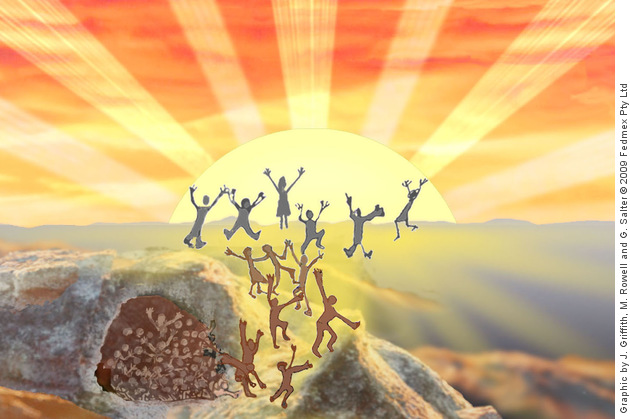
Author’s drawing of humans finally being able to escape Plato’s metaphorical
dark cave of denial into the healing sunshine of understanding of the human condition
To further explain this all-significant process of Resignation: between the ages of around 12 to 15 adolescents try to confront the human condition; they question and try to think truthfully about the seeming complete wrongness of human life, how it is all completely contradictory to what our original instinctive moral self or soul expects. But by the time they reach 14 or 15 their thoughts become so depressing that they learn that they have no choice but to resign themselves to never trying to confront the issue of the human condition again. In this respect, the individual goes on the same journey as the conscious-mind-based human race, the principle of biology that ‘ontogeny recapitulates phylogeny’. Humanity started adopting the psychological defence of denial to cope, and it was a strategy that each generation of humans also had to learn to adopt on a personal level. (With regard to our original instinctive self being our ‘soul’, ‘soul’ is defined as the ‘moral and emotional part of man’, and as the ‘animating or essential part’ of us. And since the Penguin Dictionary of Psychology’s entry for ‘psyche’ reads: ‘The oldest and most general use of this term is by the early Greeks, who envisioned the psyche as the soul or the very essence of life’, ‘psyche’ means ‘soul’—and, further, since osis is defined as ‘abnormal state or condition’, ‘psychosis’ means ‘the abnormal state or condition of our soul’, or ‘soul-illness’. (pars 379-382 of FREEDOM))
It is pertinent here to include my ‘valleys drawing’ that depicts humanity’s (and the individual’s) journey from ignorance to enlightenment (this drawing appears a number of times in FREEDOM). At the start of the frame you can see humanity, or in the individual’s case, the young adolescent, leaving the valley of our/their enchanted, innocent, all-loved and all-loving childhood and having to resign to an absolutely horrible life of living with the psychologically upset or corrupted or so-called ‘fallen’ state of the human condition, which demands you deny/forget that idyllic soulful past and the issue it raises of the human condition. This stage of Resignation, which historically has been too unbearable to acknowledge once that transition has occurred, is fully explained in chapter 2:2 of FREEDOM where you’ll find some excruciatingly honest accounts from adolescents negotiating the hellish agony of Resignation.
It is important to point out here that occasionally some adolescents refuse to properly resign: they don’t take up the hugely relieving but outrageously dishonest and horribly soul-repressing, soul-destroying and life-deadening practice of denial of the issue of the human condition. I call these semi-unresigned individuals ‘ships at sea’ (par. 1209) because they refuse to ‘pull into port’, as it were, and escape the ‘storms’ that occur when we humans tried to grapple with the human condition during our early adolescence. I’m certain that Sir Bob’s extraordinary capacity for honesty about the extent and horror of the human condition in the world is because he is, to a degree, a ‘ship at sea’. Reading his 1986 book Is That It? is like reading one long ‘Resignation poem’, a practise many adolescents engage in during Resignation and one I refer to in chapter 2:2 of FREEDOM. Sir Bob repeatedly writes about ‘a civil war inside my head which accelerates until I think my brain will explode’, which is a classic description of a ‘still-wrestling-with-the-human-condition’-unresigned mind. As you have said Sir Bob, ‘I will always rail against those things I abhor. I will always try and avoid the cant and hypocrisy I loathe so much. I will continue being an “awkward bugger”.’ Yes, truthful, unresigned people make the world of the resigned feel incredibly awkward, but thank God for such truthsayers. The only reason I can explain the human condition, as I do in Part 2, is because I have an unresigned mind that still confronts and thinks truthfully about the human condition—which is why I so love Sir Bob’s unresigned honesty about the state of the world.
Of course, for resigned minds that are committed to avoiding the issue of the human condition the resulting human-condition-confronting truthfulness of FREEDOM makes it a difficult book to read. In fact, as I describe in chapter 1:4 of FREEDOM, resigned minds are so trained to avoid thinking about the human condition that when they start reading my work they suffer from a ‘deaf effect’ where their minds initially find it very difficult taking in or ‘hearing’ what’s being said, to the extent that they even end up thinking their incomprehension must be due to poor expression (even asserting the writing is so bad it ‘desperately needs editing’), or that the treatise is too dense to understand or even completely meaningless! Conversely, unresigned minds don’t have to patiently allow their minds the time to overcome the deaf effect when reading my work; the blocks are not in place, and so they can ‘hear’ its truthful explanation of the human condition with such ease it is instantly life-saving, as this typical response from a ‘ship at sea’ that we received this week shows: ‘Have watched the video presentations [on your website] and have read to part-way through chapter two [of FREEDOM] when I read the line; “To be confused and frightened to the point of being sickened by human behaviour, indeed to be suicidally depressed by it, is the effect the human condition has if you haven’t resigned yourself to living a relieving but utterly dishonest and superficial life in denial of it.” This has shaken me to the core, as it describes my tormented life of 67 years, and it tells me why it has been so, which nothing or no-one has been able to. Having discovered this immense truth, I hope I can find in the rest of this book a way to cope with the avalanche of emotions it has unleashed. At the moment I feel overwhelmed and vulnerable, which I presume is not unknown to yourselves when this realisation occurs in people like me, and would dearly love to receive some guidance on this. I honestly believe that if anything can save the world, this book has the potential to; if the world can cope with it. Thank you. Bill [real name withheld]’. We will counsel ‘Bill’ to be patient as a lifetime of confusion unravels itself, and we will invite him to join the ‘Former Ships At Sea Club’ in which he can share his experiences. We will also explain to him that chapter 9 of FREEDOM (a summary of which appears as Part 3 of this booklet) describes how the world can cope with all the confronting truth about the human condition.
So, the situation was that until such time that we had the understanding (the enlightenment) we required—namely the fully accountable, truthful explanation of human behaviour that I will shortly present in Part 2—virtually all humans had no choice but to sensibly resign themselves to not trying to confront the suicidally depressing issue of the human condition. However, in the face of such pain and condemnation, denial alone wasn’t enough. What we desperately needed to come up with was an excuse for our corrupted condition that would relieve ourselves of the excoriating and suicidally depressing truth that our conscious mind had seemingly wrecked paradise.
And so it was at this point that we zeroed in on the aforementioned relieving excuse for our behaviour, namely that other animals are always fighting and competing and tearing each other’s throats out, and so ‘That’s why we’re competitive, selfish and aggressive—we too have savage animal instincts that compel us to compete for food, shelter, territory and a mate’. Despite knowing full well that we have a cooperative and loving moral instinctive nature that can only have been derived from a time when we lived cooperatively and lovingly, and therefore that it is patently untrue that we have a savage competitive and aggressive ancestry, our fear of suicidal depression was so great that we gratefully and determinedly embraced the lie that our distant ancestors were brutish and aggressive. Further, we whole-heartedly embraced the idea that the task then of our uniquely conscious mind was to try to control these supposed brutal, savage instincts within us. (Again, read more about the biology underpinning left-wing philosophy, as well as Marxist Critical Theory, toward the end of this Part 1.)
It was an absolutely brilliant excuse because instead of our instincts being all-loving and thus unbearably condemning of our present non-loving state, they were made out to be vicious and brutal; and, instead of our conscious mind being the cause of our corruption, which it actually was, it was made out to be the blameless mediating ‘hero’ that had to manage those supposed vicious instincts within us! Rather than our instincts being good and our conscious mind bad, our instincts were made out to be bad and our intellect to be good, which, while fabulously relieving, was in-effect a complete reverse of the truth lie! (par. 153)
This human-condition-avoiding, moral-soul-denying excuse that we have competitive, brutish and savage animal instincts gained further momentum when it was given a biological base through the misrepresentation of Charles Darwin’s idea of ‘natural selection’ as being a ‘survival of the fittest’ process. Natural selection is the process whereby some members of a population reproduce more than others in a given environment, and in the first edition of The Origin of Species Darwin rightfully left it undecided as to whether those individuals that reproduced more could be viewed as winners, as being ‘fitter’. In later editions, however, Darwin’s associates, Herbert Spencer and Alfred Wallace, persuaded him to substitute the term ‘natural selection’ with the term ‘survival of the fittest’, which is the defence virtually everyone today uses to justify their competitive, selfish and aggressive behaviour: ‘I’m just making sure I’m a winner!’ (ch. 2:9).
(I should explain that the reason it was ‘right’ that Darwin originally left it undecided as to whether those who reproduced more are ‘fitter’ is because, as is explained in chapter 4 (in particular par. 358) of FREEDOM, being unconditionally selfless, where you give your life to help others and don’t seek to reproduce more, can be a biologically meaningful, ‘fitter’, outcome. To very briefly describe why it can be meaningful, in chapter 4:2 of FREEDOM I explain that the meaning of existence is to develop ever larger and more stable wholes of matter (due to the physical law of Negative Entropy, atoms come together to form molecules, which come together or integrate to form compounds, which integrate to form single-celled organisms, which in turn integrate to form multicellular organisms, which then integrate to form societies, and so on)—and unconditionally selfless self-sacrifice for the good of the whole is the very theme of this integrative process because it maintains wholes. Selfishness is divisive and disintegrative while selfless consideration of others maintains wholes, it is integrative. The fact that the gene-based natural selection process cannot normally develop unconditional selflessness between sexually reproducing individuals—because selfless traits don’t tend to reproduce—is simply a limitation of the gene-based learning system. Integrative selflessness is the real characteristic of existence, the theme of life, hence its meaningfulness.)
The problem that emerged for human-condition-avoiding, moral-soul-denying, so-called ‘mechanistic’ or ‘reductionist’ biologists with this corruption of Darwin’s idea (with what became known as Social Darwinism) was that it couldn’t explain instances of selfless cooperation in nature, such as that which apparently occurs in ant and bee colonies, or when humans behave in accordance with our altruistic moral conscience and help others in need. So to circumvent this problem, human-condition-avoiding, mechanistic, reductionist biologists—in particular the earlier mentioned famous Harvard-University-based biologist E.O. Wilson—created the theory of Evolutionary Psychology/Sociobiology that claimed, accurately enough, the apparent instances of selflessness amongst some non-human animals, such as that seen in ant and bee colonies, was really a case of those animals indirectly selfishly fostering their own genes by fostering the survival of their relatives’ genes. However, beginning with Wilson’s 1975 book, Sociobiology: The New Synthesis, and quickly followed by others’ books, like Richard Dawkins’s 1976 book The Selfish Gene, it was argued that humans’ selfless moral behaviour is also really only this subtle form of selfishness where we are indirectly promoting the reproduction of our genes by fostering others who are related to us. As Wilson said about this human-condition-avoiding, altruistic-moral-soul-denying, dishonest application of the ‘kin selection’ theory, ‘Morality has no other demonstrable function’ other than to ensure ‘human genetic material…will be kept intact’; even saying that ‘[the philosopher Jean-Jacques] Rousseau claimed [humanity] was originally a race of noble savages in a peaceful state of nature, who were later corrupted…[but what] Rousseau invented [was] a stunningly inaccurate form of anthropology’!! (ch. 2:10)
In time it became accepted by most biologists that while ‘kin selection’ does explain the cooperative behaviour of animals like ants and bees, it doesn’t actually acknowledge and explain humans’ altruistic moral nature. As the journalist Bryan Appleyard pointed out, biologists ‘still have a gaping hole in an attempt to explain altruism. If, for example, I help a blind man cross the street, it is plainly unlikely that I am being prompted to do this because he is a close relation and bears my genes. And the world is full of all sorts of elaborate forms of cooperation which extend far beyond the boundaries of mere relatedness.’ (ch. 2:10)
To contrive a solution to this problem, Wilson then, in his 2012 book, The Social Conquest of Earth, put forward the absolutely outrageously dishonest Multilevel Selection theory for eusociality (genuine sociality). Where previously Wilson had limited himself to getting rid of the truth of our altruistic moral instinctive self or soul, he now set about using lies to dispose of the great overarching, main problem facing humankind of our conscious-mind-induced HUMAN CONDITION! The brazenness of this assault is evident in the first sentence of The Social Conquest of Earth, which is the earlier mentioned phrase, ‘There is no grail more elusive or precious in the life of the mind than the key to understanding the human condition’!! Yes, the human condition IS the holy grail of the human journey, but what Wilson does is not provide that most ‘precious’ ‘grail’ of all ‘in the life of the mind’, as his opening sentence suggested he was going to do, rather he sets about nullifying the chance of it ever being found, and, by so doing, commits humanity to extinction! Pure hypocrisy, hypocrisy of the absolute worst possible kind!
Basically, the Multilevel Selection theory argues that along with supposed competitive, survival of the fittest, must-reproduce-your-own-genes, selfish instincts, we humans also have operating at another level some cooperative, selfless ‘moral’ instincts derived from so-called ‘group selection’ (thus countering Evolutionary Psychology’s denial of the existence of humans’ unconditionally selfless moral instincts). The truth, however—which Wilson tries to bluff his way past by claiming effective warfare depended on group cooperation—is that the idea of ‘group selection’ giving rise to selfless instincts has been fully discredited on the grounds that any selflessness that develops within a group will be constantly exploited by cheaters—‘By all means, help me reproduce my genes but I’m not about to help you reproduce yours.’ The biologist Jerry Coyne pointed out this logic when he wrote that ‘group selection for altruism would be unlikely to override the tendency of each group to quickly lose its altruism through natural selection favoring cheaters [selfish, opportunistic individuals]’. However, despite this obvious flaw in the theory of group selection, those human-condition-avoiding mechanistic, reductionist biologists who have accepted the Multilevel Selection Theory have persuaded themselves to adopt it. (ch. 2:11)
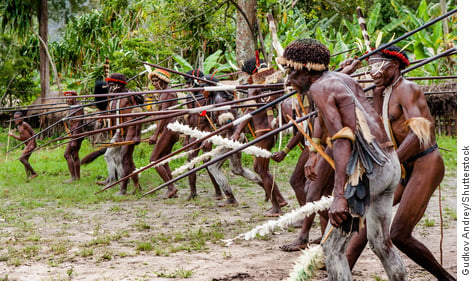
According to Wilson, our ability to war successfully somehow
produced our ability to love unconditionally!
Overall, while the Multilevel Selection Theory added unconditionally selfless instincts to selfish instincts in the mix of what allegedly forms our species’ instinctive make-up, in essence, it still amounted to a continuation of the same old reverse-of-the-truth, ‘escape-rather-than-confront-the-human-condition’ agenda—that humans have villainous selfish instincts and a blameless conscious mind that has to heroically ‘step-in’ to control them. (pars 210-214)
As I will explain in Part 2, we humans don’t suffer from a ‘selfless instinct vs selfish instinct’ situation as the Multilevel Selection theory maintains, rather we suffer from a clash between our original selfless-moral-behaviour-expecting instincts and our newer self-adjusting, understanding-dependent conscious mind that had no choice but to defy those instincts—a defiance that resulted in us becoming psychologically upset sufferers of the angry, egocentric and alienated human condition. Ours is not an instinct vs instinct condition, but an instinct vs intellect condition!
Yes, what is so outrageous, and extremely dangerous, is how Wilson has used the Multilevel Selection theory to supposedly explain that ‘grail’ which is the most ‘precious in the life of the mind’ of the human condition, saying in The Social Conquest of Earth that ‘Individual selection is responsible for much of what we call sin, while group selection is responsible for the greater part of virtue. Together they have created the conflict between the poorer and the better angels of our nature.’ In summary, Wilson asserted that ‘The dilemma of good and evil was created by multilevel selection’. Clever semblance of our conflicted condition, diabolically clever, but entirely untrue! (par. 201)
So, according to Wilson, rather than having an original completely unconditionally selfless, altruistic, moral instinctive self or soul, which we then corrupted when we became fully conscious some 2 million years ago and developed an upset angry, egocentric and alienated psychosis (which, as I said, Part 2 will explain is the true description of the origin of our condition), we simply have some instincts that want us to behave selflessly and some that don’t. While a ‘virtuous’, ‘better angels’, ‘good’ part of ourselves exists in Wilson’s ‘we have some selfless instincts’ account, there is no guilt from our conscious mind’s corruption of our completely selfless moral soul. What this means is that Wilson’s account of the human condition is non-judgmental in the sense that there are no real values, no notion of the absolutes of good vs evil or right vs wrong in the true, moral sense. What a relief for guilt-stricken humans, but what an incredible fraud! What Wilson has done with his non-psychological, no-guilt-stricken-conscious-mind-involved account is not explain the human condition but nullify it, render the issue benign, virtually inconsequential—and in doing so he is effectively burying humanity ‘a long way underground’ in the darkest depths of Plato’s ‘cave’ of denial. (par. 214)
I now need to explain that one particularly dangerous problem with the ‘we-are-selfish-because-we-have-selfish-instincts’ excuse—which Sir Bob referred to—is that it implies humans are intrinsically imperfectable, that we can’t change our selfish and competitive primal nature because it’s in our genes and instinctive. But as I said, in Part 2 I will explain that our instincts are to be cooperative, selfless and loving and it was a psychologically upsetting battle that occurred between those selfless-behaviour-expecting instincts and the emergence of our self-adjusting conscious mind that caused our conscious mind to behave defensively and defiantly in a competitive, selfish and aggressive way—and since psychoses can be healed with understanding, we can be cured of our competitive, selfish and aggressive behaviour. Humans are not intrinsically imperfectable. (par. 218)
Importantly, as initially mentioned, this dishonest idea that we humans have unchangeable selfish instincts has led to the political left-wing’s justification for dogmatically imposing cooperative, selfless, loving, ideal, politically correct values on society.
At this point I need to clarify that in order to counter the selfishness-emphasising, right-wing-justifying implications of the biological assertion that we humans are naturally selfish because we supposedly have selfish, savage, ‘survival of the fittest’, must-reproduce-our-genes instincts (which we actually don’t have because we have nurtured, entirely unconditionally selfless moral instincts), the Left set about developing selflessness-emphasising, communalistic theories that maintain that while we do have some savage, competitive and aggressive, must-reproduce-our-genes instincts we also have some selfless instincts derived from situations where supposedly cooperation was a more successful survival strategy than competition. After presenting a history of selfishness-justifying right-wing dishonest biology in chapters 2:8 to 2:11 of FREEDOM, in chapter 6:9 of FREEDOM I present a history of this left-wing dishonest biology that utilises this ‘group selection’ concept that I just described E.O. Wilson as employing, where supposedly a group who are selfless and cooperative will defeat a group who are selfish and competitive, and that is supposedly how we developed some selfless, cooperative instincts, which, as pointed out, is actually biologically impossible because of ‘the tendency of each group to quickly lose its altruism through natural selection favoring cheaters [selfish, opportunistic individuals]’.
Further, as is explained fully in the booklet Death by Dogma: The biological reason why the Left is leading us to extinction, and the solution (which is freely available on our homepage HumanCondition.com, as one of the WTM’s four key books), left-wing theorists also came up with a dishonest explanation for why our supposed selfish instincts came to dominate our selfless instincts. They claimed that following the advent of agriculture settlements that allowed for the accumulation of possessions, the desire and competition for these led to the supposed selfish side of our nature overriding the selfless side of us such that greed and warfare and domination by the more powerful took over human life.
In the case of the left-wing political theorist Karl Marx, he maintained that we only have some basic instinctive needs such as for sex, food, shelter and clothing, and that essentially we are born a ‘blank slate’ in terms of having instincts influencing our behaviour, and as a result he maintained that our mind can be inscribed at will! While I explain a lot more in Death by Dogma about how Marx and Marxist-based Critical Theory abandons science altogether, what I say here is broadly accurate across both left and right-wing ideologies—which is that while the Left presents different but equally dishonest explanations for human behaviour to the Right, the prevailing dishonest belief in both ideologies is that savage, must-reproduce-our-genes, selfish instincts are controlling our lives.
Whether it is ‘savage instincts’ or Marx’s ‘blank slate’, dishonest biology has led to the political left-wing’s justification for dogmatically imposing cooperative, selfless, loving, ideal, politically correct values on society. As Marx asserted, ‘The philosophers have only interpreted the world in various ways; the point is [not to understand the world but] to change it [just make it cooperative/social/communal]’ (Theses on Feuerbach, 1845). But of course the whole ‘point’ of being a conscious being is to understand our world and place in it, ultimately to find understanding of our psychologically upset and corrupted human condition—but biologists’ denial of the truth of our species’ conscious-mind-induced psychologically troubled human condition has allowed and empowered this left-wing attitude that we have to dogmatically impose cooperative ideal values on society. Dishonest biology has been used to justify dangerously oppressive left-wing dogma! Yes, as I initially said, Sir Bob’s support of left-wing ideology to solve the world’s problems is fundamentally flawed.
And libraries are full of this biologically dishonest nonsense. Afraid of being holistic and teleological and confronting the truth of Integrative Meaning and the issue it raises of our corrupted human condition, science has instead been evasively mechanistic and reductionist. (ch. 2:4) As Charles Birch, my Templeton Prize-winning Professor of Zoology at Sydney University when I was a student there, has said, ‘science can’t deal with subjectivity [the human condition]…what we were all taught in universities is pretty much a dead end’, and ‘Biology has not made any real advance since Darwin’ (par. 225). The polymath Arthur Koestler similarly recognised that ‘the citadel they [mechanistic scientists] are defending lies in ruins’ (par. 223).
The overall point is that when Sir Bob subscribed to the ‘selfish-instincts-in-humans’ account he was only doing what virtually every other human has been doing. Unfortunately, however, while it’s fully understandable that we humans had to invent—and then resign ourselves to believing in—an excuse to cope with our diabolically corrupted, soul-devastated condition, it means biology, and the human race that depends on it for clarifying understanding of our behaviour, is now festering in a cesspit of human-condition-avoiding, mechanistic, reductionist dishonest biological crap; it is living ‘deep underground’ in Plato’s metaphorical ‘cave’ of darkness.
In fact, if the redeeming and psychologically rehabilitating, teleological, non-mechanistic true explanation of the human condition that I’m about to present in Part 2 hadn’t arrived to liberate humans from Plato’s ‘cave’ of terrible darkness from practising so much dishonest denial, the alienation or separation from our true self or soul, or psychosis, that results from that denial would only have continued to increase, so that very soon the human race would have succumbed to an absolutely horrific psychotic state of terminal alienation. Indeed, the recent flood of movies and documentaries based on zombie, apocalyptic, escape-to-another-planet, ‘we are being attacked by aliens [by our own alienation]’, doomsday-preparation, ‘we need a super hero to save the world’ and other judgment-day-and-anxious-Bible-related-epic themes—and the actual breakout of such extreme psychosis that some people are led to fly hijacked planes into buildings, and drive trucks into crowds of people, and fire bullets into anyone they can corner, and such overall psychological fear in young people about the incredibly corrupted state of the world that there is now an epidemic of children suffering from the highly anxious and agitated Attention Deficit Hyperactivity Disorder (ADHD), and the even more extreme, can’t-cope, completely detached state of autism—all reflect the fact that the end play state of terminal alienation for the human race is upon us. (ch. 8:16G)
I should reinforce to the reader here that living in Plato’s cave of darkness from having to resign to a life lived in denial of the suicidally depressing issue of the human condition, and the truth that our species’ once lived in a cooperative and loving state, has rendered resigned adults unable to recognise how corrupted from that original all-loving state our world has become. They find it difficult to see how psychotic/soul-separated/alienated/damaged/sick/unwell the human race now is, and in their blindness carry on as if everyone is reasonably happy and healthy, and that life for humans today is more or less as it should be. Children, however, being unresigned, can still see and somehow have to cope with the horror of the real extent of that corruption. While it is true that the ‘cave-dwelling’ resigned world of denial is being forced to recognise that there are serious crises occurring from unsustainable levels and amounts of environmental devastation, resource depletion, over-population, wars, terrorism, refugees, polarised politics, corruption, failed economies, family breakdown and even mental illness, it has not been able to recognise that the real, underlying, source threat humankind faces is from the extremely rapidly increasing levels of alienation from our species’ original innocent, all-loving instinctive self or soul. The resigned world can’t see that our species is about to die from terminal psychosis, but the fact is, the psychosis-relieving understanding of the human condition that I’m about to present has arrived in what are the absolute ‘last seconds’ of the metaphorical ‘eleventh hour’ for the human race! (par. 237)
In a further example of the blindness of the resigned mind, the failure to acknowledge that our species did once live in a cooperative and loving state means there has been a subsequent failure to see how the recent enormous advances in communication technology have destroyed the trust we derive from our species’ original instinctive inclination to believe in the goodness of others; to believe that others will behave cooperatively and lovingly. There has been a failure to see that over-exposure to all the soul-distressing psychologically upset behaviour in the world has eliminated naivety from Earth—that too much exposure to corruption has meant our soul has lost its power to cause people to behave cooperatively and lovingly. There has been an inability to recognise that cynicism about the goodness of humans is now so rampant that greed resulting from the view that ‘If you’re not putting yourself first you’re a sucker’ is now endemic—which is leading to the complete breakdown of society and to levels of soul-death/alienation/psychosis escalating by the minute everywhere! (pars 1026-1027)
The fact is that on a graph of the ever-increasing levels of psychosis in humans, the levels of psychosis have been increasing so rapidly lately that the line tracking the increase is in free fall, with the amount of psychosis virtually doubling in each new generation! There has been a colossal change from the happiness and optimism of the 1950s and ’60s (as evidenced by the excitement of the music of those eras—‘the golden age of pop’ as U2 described it in God Part II), to the 1980s and ’90s when technology shrunk the world so that all the angst of the rapidly escalating alienation in people and all the resulting upset horror in the world massively spread and traumatised and virtually destroyed all the innocence of children from then on (as evidenced by the music of these subsequent generations, which changed from the 1950s and ’60s excitement to frightening head-banging angst, and now completely burnt-out, muted music). In paragraph 944 of FREEDOM, it is reported that ‘96 percent of American families are now [in 1993] dysfunctional’, and that was over 25 years ago! George Orwell wasn’t far off the mark when he titled his book about the arrival of terminal alienation Nineteen Eighty-Four.
Insightful, terminal-alienation-revealing artwork for a recent stage production of 1984
Not only has music reflected the extent of the psychosis of current generations, so has clothing, with recent generations wearing only muted dark and dull colours on often torn and worn out looking fabrics, with minimalist t-shirts obligatory. No one wears decorative clothing or bright colours anymore. It’s like everyone is trying to out-do each other in how drab and understated they can dress. In truth they are making an honest statement about how psychologically exhausted and alienated they actually are, which their zombie street parades further reveal (see Video/Freedom Essay 1 on the WTM’s homepage). Yes, the truth really is that our streets are drudging dirges of psychological cadavers.
Zombie street parades (see Video/Freedom Essay 1), which have become popular of late,
let the truth out about just how the endgame state of terminal alienation is upon us.
With regard to how burnt-out and muted the latest generations are, a 2018 study by ‘social scientists seek[ing] explanations for millennials’ moderate ways’ said that ‘something is up’, ‘teenagers seem lonelier than in the past’, and talked of ‘young people becom[ing] virtual hermits’, and of ‘taking it slow. They are slow to drink, have sex and earn money.’ It said that ‘teenagers are getting drunk [on mind-numbing alcohol] less often’ and ‘other [escapist] drugs are also falling in favour’, and ‘young people [are] harming each other much less than they used to. Fighting among 13 and 15-year-olds is down across Europe’, and ‘teenagers are also having less sex’. It said that ‘In short, young people are less hedonistic and break fewer rules than in the past. They are “kind of boring”’ (‘Teenagers are better behaved and less hedonistic nowadays but they are also lonelier and more isolated’, The Economist, 10 Jan. 2018; see www.wtmsources.com/253). The truth is that the last refuge for the terminally alienated is dissociation from the world, which, as I’ve already said, ADHD and autism are extreme examples of.
I might mention that the paralysed, can’t-cope-with-anything, aptly titled ‘snowflake’ millennials are now describing themselves as ‘The Burnout Generation’—although, unable to acknowledge their extreme psychosis from the end play state of the human condition as the real reason for their burn-out, they are blaming it on such superficial causes as stress from the overuse of ‘smartphones’ and from ‘the 2008 financial crisis’; to being ‘scared’ of the world due to ‘intensive’ ‘helicopter parents’; and in general to the ‘mental load’ produced by the ‘systems of capitalism and patriarchy’! (Anne Helen Petersen, ‘How Millennials Became The Burnout Generation’, BuzzFeednews.com, 5 Jan. 2019; see www.wtmsources.com/254). (Note, capitalism and patriarchy are explained in Part 2.)
Yes, the truth is that if the relieving understanding of the human condition that is about to be presented here hadn’t been found then unimaginable and unthinkable terminal levels of writhing and deadening alienation/psychosis and the extinction of humankind were just around the corner!
Given the resigned mind’s human-condition-evading, truth-avoiding, ‘put on a brave face’, ‘everything is basically fine and we are doing well’, massively deluded strategy, it is really to an unresigned adolescent mind that we should go for a truly accurate description of the seriousness of our species’ plight to conclude Part 1—and that’s exactly what we have in these clearly unresigned, denial-free, honest lyrics from the 2010 Grievances album of the young American heavy metal band With Life In Mind: ‘It scares me to death to think of what I have become…I feel so lost in this world’, ‘Our innocence is lost’, ‘I scream to the sky but my words get lost along the way. I can’t express all the hate that’s led me here and all the filth that swallows us whole. I don’t want to be part of all this insanity. Famine and death. Pestilence and war. [Famine, death, pestilence and war are traditional interpretations of the ‘Four Horsemen of the Apocalypse’ described in Revelation 6 in the Bible. Christ referred to similar ‘Signs of the End of the Age’ (Matt. 24:6-8 and Luke 21:10-11).] A world shrouded in darkness…Fear is driven into our minds everywhere we look’, ‘Trying so hard for a life with such little purpose…Lost in oblivion’, ‘Everything you’ve been told has been a lie…We’ve all been asleep since the beginning of time. Why are we so scared to use our minds?’, ‘Keep pretending; soon enough things will crumble to the ground…If they could only see the truth they would coil in disgust’, ‘How do we save ourselves from this misery…So desperate for the answers…We’re straining on the last bit of hope we have left. No one hears our cries. And no one sees us screaming’, ‘This is the end.’ (par. 229) Yes, truly as Bob Dylan wrote and sang, ‘It’s gettin’ too dark to see, I feel I’m knockin’ on heaven’s door’ (Knockin’ On Heaven’s Door, 1973); our species is about to die!
Saying, ‘I scream to the sky but my words get lost along the way. I can’t express all the hate that’s led me here and all the filth that swallows us whole. I don’t want to be part of all this insanity. Famine and death. Pestilence and war’, all of which is happening in our supposedly normal and reasonably healthy and happy world, is exactly what Edvard Munch’s famous painting The Scream captures. And saying, ‘Everything you’ve been told has been a lie’ reiterates the extent of the dishonest denial in the world, especially in science, today. And saying, ‘So desperate for the answers’ confirms how incredibly important are the ‘answers’ about our human condition that are now going to be presented.
After sending this booklet to the printers, an article from The Wall Street Journal by Ed Ballard (23 Aug. 2016) was re-printed in The Australian with the title ‘Yeats’s words suit our grim times’ (see www.wtmsources.com/197). Due to its confirmation of all that has just been said, we delayed the printing to allow this reference to be added. Employing the same words as I have, the article is about the now widespread ‘feeling that something appalling is around the corner’ for humanity. As evidence of that fear, Ballard cites the recent frequency of references in the media to the chilling words I’ve underlined from WB Yeats’s prophetic 1919 poem The Second Coming: ‘Turning and turning in the widening gyre / The falcon cannot hear the falconer; / Things fall apart; the centre cannot hold; / Mere anarchy is loosed upon the world, / The blood-dimmed tide is loosed, and everywhere / The ceremony of innocence is drowned; / The best lack all conviction, while the worst / Are full of passionate intensity. // Surely some revelation is at hand; / Surely the Second Coming is at hand. / The Second Coming! Hardly are those words out / When a vast image out of Spiritus Mundi / Troubles my sight: somewhere in sands of the desert; / A shape with lion body and the head of a man, / A gaze blank and pitiless as the sun, / Is moving its slow thighs, while all about it / Reel shadows of the indignant desert birds. / The darkness drops again; but now I know / That twenty centuries of stony sleep / Were vexed to nightmare by a rocking cradle, / And what rough beast, its hour come round at last, / Slouches towards Bethlehem to be born?’ To mention just one of Ballard’s statistics, in the first seven months of this year the line ‘The centre cannot hold’ has been used 249 times in newspapers, news sites and blogs, a figure already level with last year’s record total. Note how ‘twenty centuries of stony sleep’ echoes With Life In Mind’s ‘We’ve all been asleep since the beginning of time’. The latter part of Yeats’s poem is about the subconscious ‘nightmare’ fear all humans have of the arrival of the ‘revelation’, judgment-day, all-exposing ‘pitiless as the sun’, ‘rough [hurtful] beast’ of the truth about their massively corrupted condition, an unjustified fear that is dealt with later in Part 3. The true, contexted meaning of ‘the Second Coming’ is given in par. 1278 of FREEDOM.


